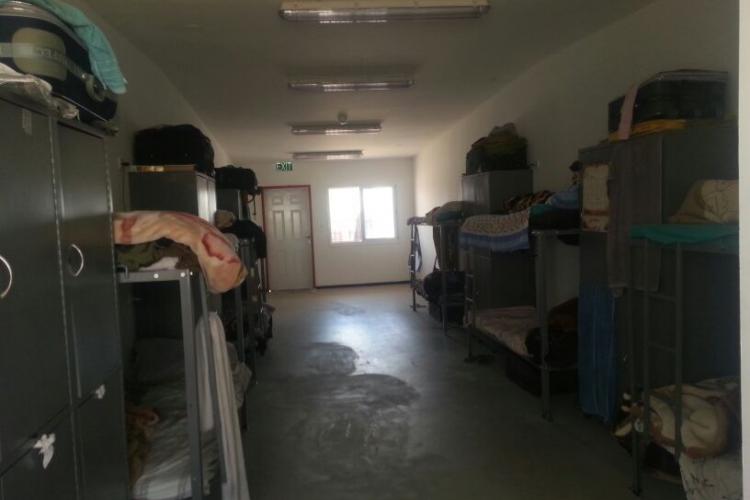Ethno-Nationalism and Immigration Detention in the Age of Migration Control
Posted:
Time to read:
Post by Maayan Ravid, D. Phil. candidate at the Centre for Criminology, University of Oxford. Her research explores intersections of border control, state penal power, race and ethnicity. Her academic studies correspond with over a decade of work on social justice issues in Israel, particularly focused on migration and minority rights. Maayan is on Twitter @MaayanRavid. This is the sixth instalment of Border Criminologies’ themed series on 'Immigration Detention in an Era of Mass Mobility' organised by Mary Bosworth.
In April 2017, I had the privilege of gathering with a group of scholars, practitioners and activists at the University of Southern California (USC) for a one-day workshop titled ‘Immigration Detention in the Age of Migration Control’ organized by Professor Emily Ryo at USC’s Gould Law School, and Professor Mary Bosworth from Oxford University’s Centre for Criminology. A few of the workshop’s objectives are worth noting. First – as immigration detention emerges as an increasingly common, complex and punitive practice of migration control globally, the response of those of us working in the field must be international. Second – since the impact of migration on individuals as well as society is multifaceted, our response must be interdisciplinary. Lastly – as the power to control people is diffused through state laws and institutions, our response must be highly collaborative – bridging and facilitating communication between academia, litigation, and social activism to complement our various strengths and weaknesses, and create powerful networks of resistance.

My presentation was based on my doctoral research on asylum detention in Israel, and drew from my experience as an activist, as well as an aspiring academic. In this post I share some preliminary insights of my work and connect them to the workshop objectives. Mainly, I argue that examples of border control in ethno-national states, such as Israel, can provide an early warning for what might develop in civic-national states, and processes to look out for.
Approximately 40,000 asylum seekers from Sudan and Eritrea reside in Israel today. They first arrived in Israel in 2005 through non-authorized entry points, fleeing persecution in Sudan or human rights abuses in Eritrea. Over a third of this group submitted asylum claims to the State but are not recognized as refugees. As of February 2017 22,000 asylum requests are pending review in the Ministry of Interior’s Refugee Status Determination Unit. One Sudanese national has been recognized as a refugee, alongside five Eritrean nationals, out of more than 1,000 processed claims. In contrast, global recognition rates for Sudanese and Eritrean asylum seekers are over 80%.

In my research I focus on Holot ‘open detention facility,’ located in Israel’s Negev desert. Detainees are held in Holot for a year-long detention, regardless of whether they have submitted an asylum claim. The facility was opened in 2013 under Israel’s 1954 Prevention of Infiltration Law. After five years of legal proceeding involving the Israeli Parliament and human rights organizations before Israel’s Supreme Court, the 5th Amendment to the Prevention of Infiltration Law was passed in 2015. This process is described at length by Ruvi Ziegler elsewhere. According to the latest version of the law, detainees must be present for head counts in the mornings, evenings and sleep in the facility. During the day, they are allowed outside the centre’s confines, though the area surrounding the facility is inhabited by several military camps, a closed prison, and desert landscape that stretches as far as the eye can see. Approximately 3,200 people are detained in Holot at this time. Around 10,000 have been detained since the facility opened in 2013.
In my presentation I discussed one important component of the Israeli case study –the ethno-national character of Israel, as a Jewish state, and its effect on immigration policies. Ethno-nationalism is a type of nationalism that perceives membership in the national collective as contingent on belonging to a specific ethnic community; and privileges that community in its institutions, distribution of rights and resources. The ethnic community is constructed around ideas of shared genealogy, language, national culture and values. In the context of migration, ethno-nationalism is said to foster a discourse of differentiation, of ‘Us’ vs. ‘Them’ contributing to exclusionary feelings.

Israel is an ethno-national state in which the dominant group is the Jewish ethnos, and open immigration is offered solely to persons of Jewish ancestry, under the Law of Return. While some legal scholars cite a reconcilable tension inherent in Israel’s definition as a Jewish and democratic state, others criticize such compatibility and claim it is an ethnocracy. I find Sammy Smooha’s ethnic democracy model most fitting – defining Israel as a type of diminished democracy due to its ethnic-based preferences. Ethno-nationalism does not pronounce the state religious – Israel largely operates as a secular parliamentary democracy. Ethno-nationalism highlights a process of political and symbolic privileging towards members of the dominant ethnic group. Pursuant to this logic, immigration policy in Israel remains largely inclined towards maintaining ethnic homogeneity within the state.
While some consider Israel as unique, due to its ethno-national character, I argue it is not, and could provide a useful warning and learning opportunity for other locales. In fact, a resurgence of ethno-national sentiments is visible across the globe – evident in the increasing support of right wing political parties e.g. the results of the US 2016 Presidential Election, historically high support for the National Front Party in the 2017 French Election, and the UK Brexit Referendum result to leave the EU. Concurrently, immigration detention is on the rise across Europe and in the US. Through political slogans such as “Make America Great Again”, “Choose France”, and “Lets take our country back”; a particular kind of American, French or British greatness is implied. Though in the past these three countries represented open immigration societies, civic-nationalism, and liberal political ideology, a new image of their model citizen is being forged. The citizen, who clearly belongs in the nation - is born in it, speaks the language, subscribes to a certain national culture, perhaps a perceived set of values, Christian religion, and -- is white.
So how does this connect to the workshop objectives?
First – While ethno-nationalism is overtly operating in Israel, it can be identified in other international settings in covert and unrecognized forms. Using the conceptual advancements offered by the Israeli case study may lend itself to tackling ethno-nationalising efforts, even if they are not officially spelled out as such.

Second – Insights from Political Science and Sociology might help understand how exclusionary legislation develops, how it is legitimated, and how we might resist it. Interdisciplinarity is therefore crucial as we tackle legal changes around us. For example, understanding anti-immigrant sentiments that fueled abovementioned election campaigns through the prism of ethno-nationalism can strengthen legal practitioners’ claims as they argue for egalitarian laws in line with democratic civic nationalism. Drawing upon Sociology to identify dynamics of group differentiation, pursuant to ethno-national logic, can provide lawmakers and educators with relevant categories to tackle while working to reform or reeducate toward more inclusive societies.
Lastly – While lawyers and practitioners necessarily work within the frameworks of the law, they must be provided with the data, empirical facts, and sound scholarly accounts to support their claims. By learning from other contexts – good and bad examples – best practices can be exchanged and new approaches developed. Together we might create a global resistance to such widespread and punitive immigration detention.
Any comments about this post? Get in touch with us! Send us an email, or post a comment here or on Facebook. You can also tweet us.
__________
How to cite this blog post (Harvard style)
Ravid, M. (2017) Ethno-Nationalism and Immigration Detention in the Age of Migration Control. Available at: https://www.law.ox.ac.uk/research-subject-groups/centre-criminology/centreborder-criminologies/blog/2017/05/ethno-nationalism (Accessed [date])
Share:








